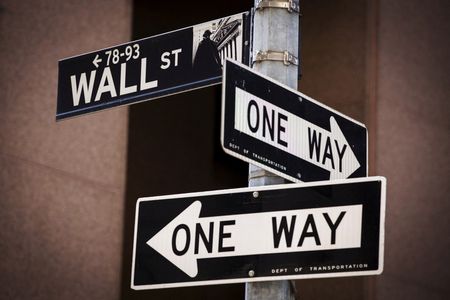 1
1 1
1

By Bansari Mayur Kamdar and Noel Randewich
(Reuters) – Wall Street stocks fell sharply on Friday for the second straight day, as investors fretted about potential steep U.S. interest rate hikes as well as deepening tensions between Russia and Ukraine.
Most of the 11 major S&P 500 sector indexes declined, led by technology and consumer discretionary with losses of over 2% each. The energy sector index jumped over 2% as oil prices hit seven-year highs.
Amazon.com Inc dropped 3.2% and Nvidia Corp fell 6.1%, with the companies weighing more than any others on the S&P 500’s decline. Tesla Inc fell 4.4% and Meta Platforms declined 3.2%, adding to the Facebook owner’s recent deep losses.
The sell-off accelerated into the afternoon, as Washington warned that Russia was massing more troops near Ukraine and that an invasion could come at any time.
“We just have to see how this plays out over the weekend and whether or not international leadership can bring this under wraps,” said Thomas Hayes, managing member at Great Hill Capital LLC in New York. “If not, then the knock-on effects could be material and that’s what the markets is worried about.”
In afternoon trading, the Dow Jones Industrial Average was down 0.75% at 34,977.6 points, while the S&P 500 lost 1.23% at 4,448.58.
The Nasdaq Composite index dropped 1.97% to 13,905.67.
The U.S. stock market slumped on Thursday after data showed consumer prices surged 7.5% in January, the biggest annual increase in 40 years, while comments from St. Louis Fed Bank President James Bullard about aggressive rate hikes rattled investor sentiment.
Traders are pricing in a half-point rate hike in March with just a scant chance of a smaller quarter-point raise, and heavy bets for a policy path that would bring rates to a range of 1.75%-2.00% by the end of the year.
A University of Michigan survey showed U.S. consumer sentiment fell to its lowest in more than a decade in early February on expectations that inflation would continue to rise in the near term.
The CBOE volatility index, also known as Wall Street’s fear gauge, was up for a second straight session and hit its highest level since the end of January.
“The market volatility from January is not over and we expect continued choppiness as investors weigh the prospect of a more aggressive Federal Reserve in the face of rising inflation,” said Richard Saperstein, chief investment officer, Treasury Partners.
Online real-estate platform Zillow Group Inc jumped 11% after beating Wall Street estimates for quarterly sales, boosted by an 11-fold revenue increase in its homes segment.
Under Armour Inc slumped about 12% after warning that its profit margin would be under pressure in the current quarter.
Declining issues outnumbered advancers on the NYSE by a 2.48-to-1 ratio; on Nasdaq, a 2.84-to-1 ratio favored decliners.
The S&P 500 posted 13 new 52-week highs and nine new lows; the Nasdaq Composite recorded 36 new highs and 163 new lows.
(Reporting by Bansari Mayur Kamdar in Bengaluru and by Noel Randewich in Oakland, Calif.; Editing by Maju Samuel and Richard Chang)